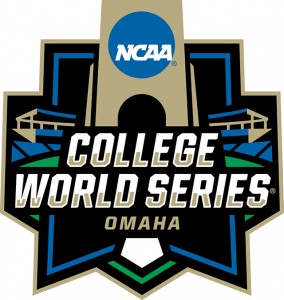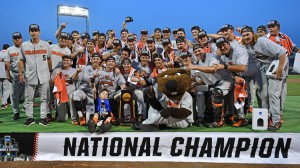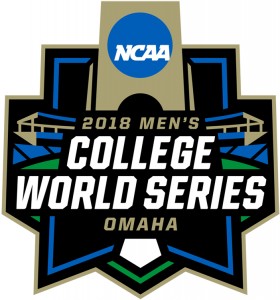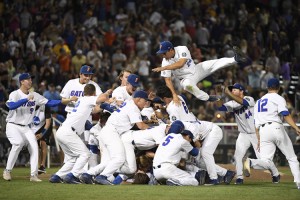Vanderbilt Wins College World Series
Monday, July 1st, 2019July 1, 2019
Last week, on June 26, Tennessee’s Vanderbilt University Commodores defeated the University of Michigan Wolverines 8-2 to win the College World Series (CWS). Vanderbilt won the best-of-three series two games to one for its second national baseball title. After a hard-fought series filled with future Major League Baseball (MLB) stars, the final out in the ninth inning—a pop fly to center—prompted a happy black-and-gold Commodore “dogpile” in the infield at TD Ameritrade Park in Omaha, Nebraska.
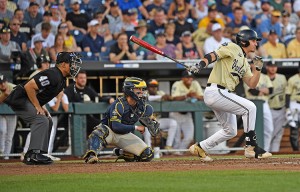
J.J. Bleday of the Vanderbilt Commodores singles in a run in the fourth inning of game three of the College World Series Championship Final on June 26, 2019, at TD Ameritrade Park in Omaha, Nebraska. Credit: © Peter Aiken, Getty Images
The College World Series is the culmination of the National Collegiate Athletic Association (NCAA) Division I Baseball Championship tournament. The tournament begins with 64 teams, but only the final 8 advance to the CWS. (World Series is an MLB trademark licensed to the NCAA.) Michigan finished second in the Big Ten Conference before battling its way to the tense CWS bracket. Michigan downed Texas Tech and Florida State on the way to the finals. Vanderbilt won the east division of the Southeastern Conference and rolled through the early parts of the tournament to reach the CWS. The Commodores then knocked off Louisville and Mississippi State to reach the finals.
In game one of the CWS Finals, Michigan jumped out to a 2-0 first inning lead, and then steadily pulled away for a 7-4 victory. Lefty Wolverine ace Tommy Henry (drafted by the Arizona Diamondbacks in the June 2019 MLB draft) pitched into the ninth, striking out eight Commodores and allowing three earned runs. First baseman Jimmy Kerr (a Detroit Tigers draft pick) and catcher Joe Donovan went deep for Michigan, and Vanderbilt outfielder J.J. Bleday—the fourth overall pick (Miami Marlins) in the draft—blasted his 27th home run of the season, the most in NCAA Division I this year. (Thirteen Vanderbilt players were chosen in this year’s MLB draft, the most of any CWS team.)
In game two, Vanderbilt rolled to a 4-1 win behind the power pitching of freshman Kumar Rocker, who struck out 11 Wolverines in 6.1 innings. The Commodores scored first on a fielder’s choice in the fourth. An inning later, wild pitches by Michigan allowed two more Commodores to cross the plate. Vanderbilt catcher Philip Clarke (drafted by the Toronto Blue Jays) clubbed a solo homer in the seventh, and reliever Tyler Brown recorded the final eight outs to seal the Commodore victory.
In the deciding game three, Michigan notched a run in the top of the first, but Vanderbilt centerfielder Pat DeMarco (drafted by the New York Yankees) ripped a long ball to left to tie the game in the bottom of the second. A bases loaded walk and a clutch two-out, two-run single gave Vanderbilt a 4-1 lead in the third. A pair of runs in the fourth and a single tally in the seventh padded the Commodore lead. Michigan scraped a run across in the eighth, but Vanderbilt too added a run for a commanding 8-2 advantage. Desperate for a rally in the ninth, all Michigan could muster was a base on balls before the series-ending third out. Towering Vanderbilt starter Mason Hickman struck out 10 batters over 6 innings for the win.
The CWS win was Vanderbilt’s second. The team’s previous title came in 2014 over Virginia. Michigan won the CWS in 1953 and 1962. The CWS has been held in Omaha, Nebraska—a central and generally neutral location—since 1950. The series was played at historic Johnny Rosenblatt Stadium—once the largest minor league stadium in the United States—through 2010. TD Ameritrade Park has hosted the CWS since it opened in 2011.

